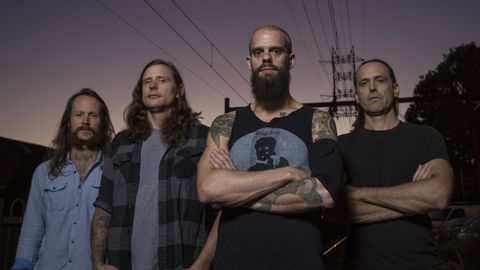There’s enough trauma in the world right now that even the tiniest crack of light is something to cling to. For Baroness, that crack of light comes in the shape of their fourth album, Purple. In August 2012, a horrific bus crash almost wiped the US band out, leaving singer/guitarist John Baizley hospitalised and in danger of losing his arm. Purple is the product of both personal trauma and Baizley’s long and painful physical rehabilitation.
Pre-crash, Baroness were outgrowing the underground metal ghetto that spawned them. Their previous album, Yellow & Green (the colour-palette titles are a theme), was a sprawling double that jettisoned the sludgy noise with which they made minor ripples. Instead, they took their music to weird places: bucolic Americana, 90s shoegaze, even the faintest whiff of chiming U2 stadium rock. It pointed towards a bold, brave future. And then came the crash.
Purple simultaneously builds on what its predecessor achieved and reins in its sometimes overwhelming sprawl. Shock Me may come clad in heavy metal drag – fuzzy guitar, tumbling drums – but its deceptively simple yet electrifyingly huge chorus indicate keener minds at work.
The billowing Try To Disappear is even more honest in its intentions: a pop head on a bodybuilder’s torso. It’s telling that Purple has been produced by Dave Fridmann, a man who coaxed the humanity out of such art rock misfits as The Flaming Lips and Mercury Rev.
Lyrically, Purple errs on the side of the battered. ‘She cuts through my ribcage and pushes the pills deep into my eyes,’ sings Baizley on the undulating, spiritually dislocated seven-minute centrepiece Chlorine And Wine. His arid holler posseses the same limited effectiveness as that of Jaz Coleman. It won’t win him the next series of The Voice, but it carries all the urgency and desperation you’d expect from a man who once woke up with a 20-ton bus on top of him.
You can trace the classic rock DNA that runs through Purple. There’s Thin Lizzy in the twin guitars of Morningstar. More obviously, the instrumental Fugue sounds like a snippet of a great lost Pink Floyd song. But this mostly sounds like the work of no one other than Baroness.
You don’t have to be a shrink to work out that Purple is a work of pure catharsis, and a sometimes tortured one at that. But whether they meant to or not, Baroness have made an album that brims with hope. Right now, that’s a hell of an achievement.


